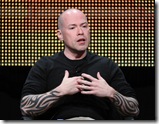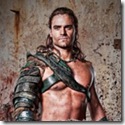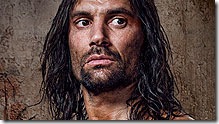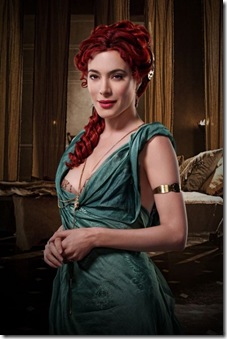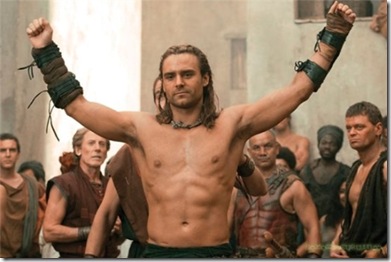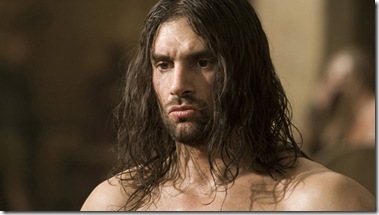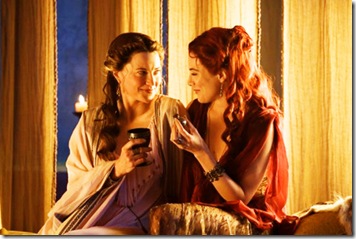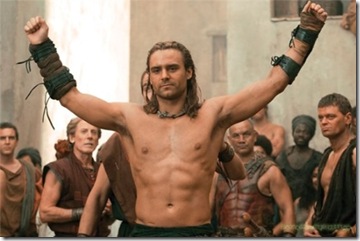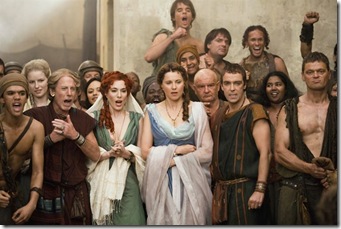In a rare confluence of events – a star’s illness; an open timeslot; fans clamoring for more backstory, and an idea intended for a postponed second season – Spartacus: Gods of the Arena was born. The six-episode prequel to Spartacus: Blood and Sand fills in the background history of Batiatus and Lucretia and how their ludus [gladiator training facility] came to a certain level of prominence before the arrival of the famed Thracian gladiator.
On Monday, I had the opportunity to take part in a conference call with series creator/showrunner/writer Steven S. DeKnight and stars Dustin Clare [Gannicus future champion of Capua], Manu Bennett [Crixus, here new to the ludus] and Jaime Murray [Lucretia’s old friend and fellow partier, Gaia].
Note: for some reason, this call had a lot of weirdness, technically – dropouts, cutoffs, static – so the transcript isn’t perfect. It was still a fun call, though.
Hey guys. Thanks for doing the call.
Steven S. DeKnight: Certainly.
Hi Steven. So my first question is for Manu and I wanted to know how was it to have to sort of rethink Crixus and go back before he was the champ and new at the (ludus). How did that go and how was your approach to that?
Manu Bennett: Can you hear me? Do I need to press star 1 did somebody say something?
Dustin Clare: Hear you mate.
Bennett: You can hear me. Good stuff. Hello Dustin. Good day…
(Unintelligible) to Australia and they don’t understand us mate.
You know, look, I mean, the prequel ended up being, you know, such an opportunity for the story line of Crixus. You know, Season 1 when I first started playing the role – I’ll tell you something. When I got given the role and I had to think about the relationship with Spartacus, it took me back to a schooling incident where I had a guy who we were mortal enemies at school and we hated each other and the only expression we gave each other was very negative and hateful.
When I was 14, I was involved in a car accident and my mother died in it and I was in a coma in a hospital. And I woke up and this guy was in my hospital room and he burst into tears. And I was like, what’s this guy doing here. He’s my mortal enemy. And since then, I’ve become his – I was the best man at his wedding, he’s my best mate from school, remained friends always, but we were mortal enemies.
So I started playing Crixus in the first season relative to that relationship. And Rob Tapert came up to me and said, "Manu, what are you doing with Crixus? I don’t like him at all, you know, and he’s got to be a romantic leader in our show soon, you know. And (Navy)’s not going to like him either. We don’t like this guy."
And I said, "Just bare with me." Because I was trying to play this character that was – that you couldn’t see, you know. All you could see was your enemy.
And, you know, the story then went on to, you know, many a battle between Spartacus and I. To the point where I think I turned to him and I said, "look, you and I could have been as brothers once."
But, you know, this whole entire storyline of Season 1 was a very, you know, bullying, strong, ultra macho kind of character (unintelligible) Crixus. But then, you know, the audience got to see the other side of him, like I saw the other side of this guy, when he popped up in my hospital, because this guy’s mother had died as well when he was young. So it was like these two guys who hated each other at school because he was a westie and I was this (unintelligible) hair product. And, you know, so this character that was in Season 1 that was kind of what I played as the bully and then he was the champion of Capua.
In Season 1 — sorry, in the prequel, sorry — in the prequel, we’ve turned around and we discovered Crixus before he had any of that in (unintelligible), before he had any of that power and the writing — as soon as I read it, it was just such a great opportunity for me to show somebody vulnerable and not as a powerful and, you know, needing to learn from the very beginning any meaning of being a champion, any meaning of being a bully.
You know, getting to the point where he could – would be this kingpin of a prison, you know, and a tough guy. So I think, you know, the fans are going to be really pleased, I believe, because they’ve come to know this side of Crixus and now they’re going to find out sort of where it came from, the origin of Crixus’, (whose) actually, you know, vulnerabilities and human before becoming the champion.
That’s a very long answer.
DeKnight: And I got to add that it was a pleasure and such a rare opportunity to go back in time and actually portray that instead of just talking about it. And Manu does a magnificent job of showing us how Crixus pulled himself up by his bootstraps.
Okay good. And for Dustin, how’s it feel to be the new guy? How was it?
Clare: The new guy. The new guy’s always great because, you know, you get to go in fresh with, you know, your own choices and you get to bring new life and breath kind of a new energy into something that’s already established. So (unintelligible) choice of being the new guy so to speak, yeah. I play Gannicus. Gannicus is a pretty self-destructive gladiator who I modeled really on (Anthony) (unintelligible) the boxing arena and he’s very confident and cocky fighter, but extremely skilled.
Gannicus has an extreme amount of skill, but he’s very self destructive and he’s always trying to escape his reality. And, yeah, he was an interesting character who we get to really unpick through the six episodes. And we have a great through line and a great opportunity to see this man rise within everything that kind of keeps him down, he sort of butts against.
All right so which one of the two of you, when you sparred at gladiator camp, came out on top?
Bennett: We’re both…
Clare: (Unintelligible).
Bennett: …bent over vomiting.
What was that?
Bennett: Nobody survives gladiator boot camp. (Unintelligible) learning had to deal with pain.
Clare: Yeah, yeah. I’ve probably still got a couple of war wounds from Manu.
Steven, this one is for you. This is my first time watching the series and I think it’s very interesting. There’s betrayal, sex, (a lot of nakedness) and all the sinful addictions that (unintelligible). Can you describe a little bit why Gods of the Arena isn’t like anything else on TV?
DeKnight: Well to start with we’ve got the support of Starz, which has been fantastic. They let us tell the story that we want to tell. You know, they don’t’ try to rein us in and if you’ve seen the first episode, you know, we go places that other shows don’t, quite frankly. We try not to censor ourselves. We try to tell the best story we can with what we have.
And then, you know, it’s really unlike any other TV show in that respect, but also visually it’s – we’ve taken a page from Zach Snyder’s book. We loved his work and decided to shoot the whole thing indoors on green screen and give it a very graphic, novel look and feel. So in that respect too it’s absolutely unlike anything out there on TV right now. And also in respect to the action, we do feature-level action on this show that Dustin and Manu can attest to, that is extremely grueling, time consuming and other shows just don’t tackle it on such a grand scale.
And since Jaime is absent, can you tell us a little bit about her love scene with Lucy Lawless?
DeKnight: Yes well, not to give anything away to the fans, but Jaime Murray’s character, Gaia, comes into town and you find out she’s an old chum of Lucretia’s from back in the wild days. And Lucretia is trying to become more respectable. But Gaia is still the wildcard, unlike Ilithyia and Lucretia in Season 1, Gaia actually loves Lucretia, will stand by her through thick and thin, but is not adverse into hulling her into a bit of old-time trouble.
And they’re very, very friendly. I’ll just leave it at that.
And for Dustin, the new guy and the sex symbol, does this relate in any way to your personal life? Do you find that women come up to you and talk to you about – (talk) to you as a sex symbol? Sorry.
DeKnight: Dustin, I’m going to start hanging out with you – I want to get…
Clare: I don’t know. Manu came up to me a lot in the show. No, I’m sorry, (unintelligible) take any of that stuff serious. I don’t take any of that stuff seriously to be honest with you.
You know, I look at it from a working perspective and from, you know, perspective of like, you know, getting in and trying to do the best work I can and, you know, I’m passionate about being an actor and I’m definitely not passionate about being a sex symbol.
Finally, if I may, for Manu, how was your training? How difficult was it or rigorous was it or intense?
Bennett: You know, you get what you put in. You know, you get out what you put in and we’re all very aware of that on this show because it’s not just an acting job. It’s basically, you know, we need to perform like professional sports people, you know.
You know, all our stunt guys, you know, lead the way with a lot of the fighting and we follow. You know, and we follow just as rigorously both in the training and the performances on set. So it’s extremely demanding. We have to be very careful about just how far we go because 95% of it is real and the other 5% is just trying to avoid the other person’s (sword).
You know, it’s commitment and evasion and – but we’ve gotten to trust each other very much on set. We’re almost like a Cirque de Soleil of gladiators, you know. We move with finesse and speed and with a lot of trust for each other. And sometimes it doesn’t work and we get whacked.
And, I mean, I think I’ve been to the emergency ward three times at the local doctors. You know, not the emergency emergency, but to the, you know — you know, it’s challenging, but none of us back away from that. We’ve all had a good whack on the hand or a whack on the arm or, you know, a bruise from the falls that we constantly have to do and, you know, I mean, to most of us — and I think Dustin can attest to this — on our side of the world, we play rugby.
And growing up like that, you get home from a rugby match and that makes you feel good as man. So when I get home from a day of filming of Spartacus, I feel like a man. I feel like I’ve done a hard day’s work and I’ve got a few bruises and whatnot but, you know, it’s all very much worth it and satisfying.
My question is basically about — I’m really excited about the prequel — and Doctore, as a character, was very much a mystery in Season 1 and I was wondering if you’re going to delve into his back story or any of the other characters’ back stories that you are really excited about telling.
DeKnight: No, absolutely. Doctore, you get to learn a lot more about Doctore and his relationship with Gannicus and Crixus. And we get to learn an incredible amount about what drives Crixus. And really all the characters that you’ve seen in Season 1, even characters like Gnaeus – you may remember Gnaeus from Season 1. He’s the guy that Spartacus threw off the cliff. You even get to know a little bit more about him.
So we delve pretty deep into people’s back stories and flesh them out. And you also learn a lot about what drives (Batiatus’ Cretia) when we introduce a character we talk about in Season 1, but never see, which is Batiatus’ father, Titus.
Is there any one character you’re more excited about their back story than the other?
DeKnight: Oh boy, that’s a tough question. I love all my children equally. All their back stories are so juicy and surprising by the time you get to the end. There are major revelations about all the characters you knew in Season 1 that are in the prequel that I think will be quite surprising.
Is there like an overall theme for the prequel that the fans are supposed to – some kind of theme that the fans are supposed to get out of the prequel that kind of makes it worth the venture back in time?
DeKnight: Oh, yeah, I mean, well, you know, we deal with the obvious grand themes of love and the struggle for life. Also a really important scene in this prequel is you reap what you sow. It’s your actions will lead you to your ultimate fate, which is something we also explore in Season 1.
I’m going to slightly cheat a little bit. I just saw the announcement that Liam McIntyre was picked up for Season 2 and you guys are going to start shooting soon. Can you give us any kind of additional juice or information?
DeKnight: The only juice I’ll give you is that it’s extra sweet. Season 2 is shaping up to be a hell of a ride. We’re actually almost halfway through figuring out Season 2.
You know, we’re obviously deeply saddened that Andy couldn’t continue with us. He was a huge part of the show’s success. And we’re – you know, we wish him the best and a speedy recovery.
And we did an exhaustive search to find somebody not to replace Andy, but to step into the role of Spartacus. And feel very fortunate that we were able to find Liam, who we really felt really embodied everything we were looking for in the character moving forward.
First of all, I just want to thank you as a guy for creating one of the best shows on TV.
DeKnight: You know, I’m working for you.
Was it difficult to create a prequel out of sequence?
DeKnight: You know, the challenge, because originally a very small part of this story I had designed as a flashback mid-season in Season 2. John Hannah expressed interest in coming back.
Of course, you know, we practically chopped his head off at the end of Season 1. So unless he’s a head in a jar, we had to go back in time. So we had planned a flashback episode centering on Batiatus and his father. You know, it probably would have been amounted to eight or nine scenes in the flashback. So we took that idea and expanded it as the seed and grew the tree of the prequel.
The most challenging thing about going back in time – I mean, I was thrilled for the opportunity, very saddened for the cause, but thrilled for the opportunity that we could really flesh out some of the character, that we could flesh out Crixus’ back story, that we could flesh out Doctore and then Lucretia and really see them in the early days.
The hardest part was we had never actually planned for that so we had to make the prequel fit a lot of the story and mythology in Season 1 and there were times where that became very difficult, where what we needed to do in the prequel went against what was cannon in Season 1.
And I very much come from the Joss Whedon boat, that I like continuity so we really strived to keep everything kosher between the two projects.
The writing on the show is excellent.
DeKnight: You know, I’ve come along way because I remember one of the reviews for when we first premiered they said it was as if it was written by a 12?year?old boy that doesn’t know how men speak.
I’d just like to say, who’s laughing now.
Yeah, off with his head.
Actually was there a lot of research involved with writing for that period of time?
DeKnight: Well the historical research – we have two historical consultants that keep us as straight as we possibly can. You know, first and foremost, we are a television show. Our job is to entertain you and make you want to come back for the next episode.
But we try to be as historically possible – accurate as possible within that context. You know, we do take our liberties, you know, little things like the arena in Season 1 is actually bigger than it would be at this time period. It’s more of an imperial time period arena. But we do try to stay as accurate as possible.
Speaking towards the dialogue, you know, I always say it’s a match up between Shakespeare and Robert E. Howard, who wrote Conan. So it’s a little bit of both. Luckily, I’ve got an extensive theater background so I’ve studied Shakespeare up and down and all around, which really, really helps.
I don’t pretend that this is Shakespeare. It’s kind of Shakespeare light. If it was Shakespeare, I think we would have lost 90% of the audience by now because they wouldn’t actually understand anything that’s being said. Sometimes it’s a little dense even for me. But we definitely wanted to give it an elevated voice, a unique voice.
Dustin, Gannicus appears to have it all, you know, the looks, the body, the woman. Is his life much different than yours?
DeKnight: Yeah you bastard.
Clare: Yeah, yeah, yeah, very different, very different. I come from a small town on the coast of New South Wales and I spend a lot more time in the ocean than Gannicus does.
So was this one of the most physically demanding roles that you were ever in?
Clare: It was very much physically demanding role that I’ve ever been in, yes. Yeah, it was intense. The training, the constant training, once you start filming, keeping up the training we were doing – I was doing seven hours a day for three weeks — different things, stunts, cross-training, fighting with double swords and then a session in the pool. So that was quite intense.
But yeah, very physically demanding. Like Manu said, you come away with a lot of cuts and bruises, you know, we’re all aware that we hurt each other, you know, physically all the time. But like, you know, we’re in it together. We never really mean it and, you know, we’re all fighting for a great result ultimately.
And, you know, a big testament to that is definitely to the fight choreographers, (Alan Populton), (Tim Wong), (Paul Shatkoff), those guys, are just, you know, world-class stunt choreographers and, you know, Manu and myself and Peter, everyone, we’ve all got to learn from the guys who are best in the business and they’re skills that we’ll have for the rest of our lives as actor so that’s a big plus.
Manu, how is it working with long hair this time around?
Bennett: Loved it. Not everybody has – not everybody did. I met one of the Starz lady here and she’s like, "oh we don’t like you with the long hair." You know, I loved it. I really did.
It gave me an opportunity to – you know, I lost a lot of weight in the role because I had to come back as a slave who had been working in the mines and probably didn’t eat very well and, you know, obviously didn’t shave or get his hair cut or – you know, so if you can imagine sort of the embodiment that I was able to give Crixus as the first episode of Season 1, which was, you know, like this machine, finely-tuned machine, that’d been polished and buffed and adorned to be the champion of Capua.
It was a great, a great opportunity as an actor to lose all of that and become a nobody and basically a homeless person. You know, that’s what people referred to me as. I would actually walk around the areas that I come from, which is in New Zealand, and people would like at me like I was a homeless person. (Unintelligible) doused in oil from filming.
You know, it was a wonderful opportunity to strip away everything that made Crixus anything in Season 1 and to go from Episode 1 to Episode 6 — you know, only six episodes — to make such a wonderful transition (by) Steven DeKnight, you know, but a fantastic transition coming from mines to raising a sword covered in blood and screaming "I’m the champion," "The new champion," or whatnot.
But, you know, I also, you know, had a, you know, Dustin to play off and Dustin playing the way that, you know, he played Gannicus, you know. You see in the very early episodes, you know, Crixus’ admiration of what it would be to have something, to have – to be a hero, to be a champion, you know.
And, you know, Dustin and I, I believe, we found just as good a camaraderie and an essence of character mixes as, you know, I’ve found with Andy who, you know, was exceptional, you know. So I think the viewers will find the same bonding of brotherhoods storylines that they found in the first season within the prequel. You know, they’ll be just as happy and, if anything, they’ll be happier because, you know, the camera techniques improved, the fighting choreography was taken to another level, the costuming, everything, you know, the bar was lifted.
And we were, you know, all trying as hard as we could to jump over it.
So let me just get this out of the way because our fans totally want to know. But can you give any sort of update on how Andy’s doing? Hello?
Bennett: Steve?
Hello? Yes.
DeKnight: Who are you sending this question…
I guess that would be for Steven – and possibly Manu knew.
Moderator: Steven are you there?
Steven? I’m getting blanks.
Moderator: His line has disconnected.
Bennett: I’m here. Manu. I can hear you.
Okay I don’t know if, Manu, if you know anything about how Andy’s doing. I wanted to ask Steven also, but do you know anything also?
Bennett: We’re all just praying for me, you know. We’re all praying for him, hoping that the cancer’s moved on, if it has. You know, it’s a bigger battle for him, but, you know, we’re all in huge support of Andy. We are all like so deeply – I can’t even tell you how deeply saddened it has been for all of us to know that, you know, our friend, our colleague, our inspiration has been given such a challenge at such an amazing time. Can you still hear?
Yeah, it keeps going in and out though.
Bennett: Yeah okay I’m not quite sure why. But look, I mean, it’s going to be a longer period of time before any of us know what’s going to be the result of Andy right now. But, you know, all communications would indicate that he’s in very high spirits and that he’s fighting this thing with has much strength as he poured in the show, you know. So, you know…
Well, okay, thank you for that update. And so for – on this new series or whatever, prequel, you’re talking about all the training and you guys had to do and feeling all manly on the — but how do you recover from a day?
Bennett: It’s difficult.
Clare: Yeah.
Bennett: We usually don’t. Go on Dustin.
Clare: Well for me it was getting in the pool and swimming laps and clearing my head. You know, Manu’s got a family that he has to go home to. I’m sure that’s a piece of his kind of detaching himself from what he’s been working with. But, yeah, for me it was about getting in the water, reconnecting with the water and just clearing my head. How about for you Manu?
Bennett: Yeah, look it’s – we do – we are supplied, you know, with a masseuse, you know, so we do get deep tissue massage, which we need.
You know, as I said to you before, it’s a professional sport that we’re playing. It’s not just an acting job and, yeah, we’re in constant need of massage and often just rest and a lot rest. You know, I mean, sometimes they alter the shoot, our timing of scenes if somebody’s been injured and it does happen, you know… I mean it does happen. You know, New Zealand is a little bit different to America. I don’t think we get away with what – in America, you know, as what we do in New Zealand with all these fight scenes in America, I think, somebody to go, "hey wait up (unintelligible)."
You know, in New Zealand there seems to be a little – we’re kind of like the wild, wild west bunch and, as a result of that, we do commit and I think we – it’s the point of difference in our show I think, you know, with a bunch of guys that we’re under such stringent rules and every little extra bit of, you know, dynamic that we can put in there we do. You know, we’re constantly, you know, working through safety issues to try to minimize injuries, you know. There’s a lot of crash mats that are buried under the ground, but sometimes you miss them and you end up going home feeling like you may not walk again.
You know, there’s a variance of the types of swords that use. Everything from a solid, you know, steel sword to a rubber sword. But a rubber sword bends when you hit the other guy’s sword that they used for body blows. You know, but sometimes, the swords get mixed up and the harder one come in – it’s something we realized. Wait up, let me swap the sword. I’ve got a nice scar on my chest to testify to where the hard sword wasn’t taken out. But, you know, you know, we have no complaints about our commitment and what the roles require of us.
You know, but yes, the recovery is important, very important. It’s not always there for us to be (unintelligible) – you know, and sometimes we just have to soldier on and often, very often, we do, you know, regardless of injury, regardless of tiredness, regardless of not having had the time to properly choreograph. We just go ahead, you know, but, you know, we’re good at it now with being at it now for a solid season and a half and we’re just – I think we’re just warming up as well.
I’m sure Steven DeKnight has got a game play that we are all going to have to keep on rising to.
DeKnight: You know I do. For some reason I got booted off this press call…
Clare: That was me Steven. That was me.
DeKnight: You son of bitch.
Jaime Murray: Me too, me too, I’m here too. This is Jaime Murray.
Moderator: Oh.
DeKnight: Oh Jaime.
Moderator: Hi.
Murray: Hi.
Moderator: Hi Jaime. Thanks for joining.
Murray: Always late to the party. Thanks for having me.
Oh hi Steven.
DeKnight: Hello.
I had asked Manu earlier if there was any sort of update on Andy, if you knew.
DeKnight: There’s nothing that I can say. Andy, of course, is being very private about his condition and what he’s going through with his family. The last thing I heard — it’s been a little while — but, you know, he was attacking it like a true champion and I have the utmost faith he will pull through with flying colors.
Okay. And then moving to this. You had mentioned something about like this season is also about you reap what you sow.
DeKnight: Yeah.
And as we saw from the first episode, Gannicus has, you know, a little problem with hubris. Is that going to play out in these six episodes?
DeKnight: Oh it certainly will. You know, every great man has his downfall. It’s just a matter of when and where.
And I saw him eyeing Doctore’s woman.
DeKnight: You know, he eyes every single woman that passes by. That’s the great thing about his character.
Clare: (Unintelligible).
DeKnight: He’s a, you know, he’s a rogue.
Yeah.
DeKnight: He’s definitely a charming rogue.
And will that hubris or whatever his downfall that he might or may or may not have effect the way that Crixus looks at him and learns from him?
DeKnight: You know, Crixus’ relationship with Gannicus is – it’s kind of similar to, although not quite as antagonistic, as Spartacus and Crixus. Where Spartacus comes in and has to, you know, learn how to fight. That Crixus is better than he is. It’s a bit of a role reversal.
It’s not quite the same. In our prequel story, Crixus very much looks up to Gannicus. That doesn’t mean that they won’t at some point try to kill each other because that’s just the nature of the game and the ludus.
Right, right. And since Jaime just joined us, I want to ask how you feel, Jaime, being the troublemaker in this series.
Murray: It’s always the best role isn’t it? I don’t think Gaia sees herself as a troublemaker really. But I think she probably gets a certain thrill out of having – out of the power that she wields and generally the power that she wields causes a bit of trouble along the way.
Does she genuinely love Lucretia or is she using her or is it both?
Murray: I think it could be both, but I do think, yeah, she genuinely loves Lucretia. She doesn’t really have much in the world. You know, it’s a time where women had very little power, they couldn’t vote, they couldn’t own property, they had to be married. It was really looked down on for a woman to be without a husband and she finds herself alone in the world and Lucretia is all she has.
Okay. Well…
Murray: So needs love, love needs.
Just (talk a little bit about the) training and preparation for this show if possible.
DeKnight: I’m sorry, you cut out a little bit there. Can you repeat your question?
Yeah could you give us a little bit more background on the training and preparation?
DeKnight: The training and preparation, I’ll leave that to my gladiators.
Clare: The training was this year – hi, it’s Dustin Clare. I play Gannicus. The training this year was slightly scaled down boot camp to what they had in the first season. It was two weeks. I had three weeks and for myself it was four hours in the morning of circuit training, stunt training and then a lunch break for an hour and then two hours of sword training and then an hour sleep and then one hour in the pool. So it was about seven hours of pretty intense training for me.
And Manu would have had a similar regiment I imagine. Manu?
Bennett: Yeah, yeah, I mean, you know, gladiator boot camp is all about just really getting a group of guys and some girls this year together and really looking at the physical unity of, (unintelligible), you know, scenarios. So once we do hit (unintelligible) and we’re around other gladiators and whatnot it’s…
Did I lose you?
Murray: Hello guys. Have I lost you?
Clare: Manu?
I’m here.
DeKnight: I’m here.
Murray: Steve, enough about Manu. What about me?
Moderator: Okay.
Bennett: I’m actually just being silent to see if I (unintelligible) can freak you out.
Yeah so, you know, I mean, it’s more geared toward, I believe, and I think that’s the wonderful nature of it, the seamanship of all the, you know, seamanship of the gladiators and guys because we all end up being in these arenas, you know, so close to each other doing physical work. That’s one of the strong aspects of it.
I mean, the other aspect of it is just the fitness side of it and, you know, it’s a mixture of cross-training that, you know, really pushes us to a very high level of cardio, but then we do a lot of strength work so that we’re not just burning our muscle away, you know. You know, I’m sure that Starz has got plans to keep on letting the public know about gladiator boot camp, but, you know, it’s a wonderful design…
Clare: (Unintelligible) it’s a really great team bonding experience isn’t it?
Bennett: Yeah absolutely which is, you know – that’s welcome to the brotherhood. I mean, we say that as soon as we walk into boot camp not when we walk on the set, you know.
And also it’s a, you know, it’s where we start to learn how to do the sword fighting and, you know, basically it’s so dangerous to be wielding a sword around with another person that, you know, we have to go three weeks (unintelligible) this is routine one, which is, you know, two downward strikes and a cut through the middle.
And this is two, which is the reverse, you know, down the left, down the right, cut through the middle the other way. And then, you know, number three, which is an up strike through the leg and up strike through the other leg and then a cut through the middle.
You know, we do these over and over and over so that we – the repetition is burned into our memories and (Al Populton) says to us, "okay guys we’re going to combine number one and, you know, start putting it together like that." We’re very aware in our minds of what those particular combinations of sword play are. That’s another one of the strong aspects of it.
The other one (unintelligible). So we get our crash mats and we do a lot of leaping and tumbling and backward rolls and being pushed by a guy so that he forces us backwards and we go flying and we roll over backwards, you know. It’s gymnastics in that regard so, you know, it’s quite a full gamut. Gladiator boot camp isn’t just about fitness as much as it’s about seamanship and it’s about… about learning weapon orientation and orientation of space and working together in an arena.
Jaime since you’ve joined us thank you so much.
Murray: Hello.
Hello. Could you tell us a little bit more about, you know, being kind of like a woman with power in this show, but you cannot – in like, like they said earlier, like a brotherhood. How it’s like to be (unintelligible) the only female?
Murray: I’m sorry. You keep on coming in and out and I’m just getting bits of you. Say that again.
How is it being in a show with a bunch of guys half-dressed?
Murray: Well that’s been my whole career really. You know, it’s interesting when Manu was talking I was – and he was talking about the bonding of the brothership, I think, as an artist in this show, as an actor in this show, so much of it relies on trust.
I mean, I think to be a good artist, to be a good actor, you really need to trust the people that you’re working with and you know, in this show, you know, it has a lot of physicality, whether you’re a gladiator or whether you’re a scantily clad lady, you know, and I really had to look in the eyes of John and Lucy and the actors that I was working with and trust them 100%.
And, you know, I felt for the guys. You know, I’d be standing off in the pulpits looking down at them and, you know, I became really, you know, close with some of them and, you know, it’s a hard job and it really kind of pulls you all together, you know, this huge experience that you’re all sharing.
Perfect. And Steven?
DeKnight: Yes?
I just wanted – just for fun because you said that one of your reviews said that it was written like a 12?year?old who didn’t understand men.
DeKnight: Yeah.
How do we know how they spoke back then?
DeKnight: Oh we absolutely don’t. I mean, you know, we have records of how they spoke obviously translated from Latin, but my approach is very much – again, I don’t say that I am Shakespeare because there is no Shakespeare. He is truly the master and has written some of the most beautiful stuff ever. But back in Shakespeare’s time, with his plays, people didn’t speak like that during his time, you know. It’s purely an artifice. It’s a style to give the impression of a different time period. I don’t for a second say this is exactly the way people spoke.
No, that’s what I’m saying is like how does this reviewer guy…
DeKnight: Oh, I think his issue was more with the man-to-man talk that he didn’t quite care for. But, you know, this world it is a bigger than life world so we definitely embrace that in all aspects, including the way men talk to each other.
Moderator: There’s a little static on the line.
I was going to say the static was drowning out the voices in my head. Well I was sitting here, you know, sitting for like the last, you know, 45 minutes listening to Dustin and Manu about, you know, training and stuff. This – you know, working on this show sounds like the primitive version of Fight Club, except you can talk about.
Bennett: Yeah, you know, it is Fight Club, you know, it is. I mean, the same premises there. Men sort of, you know, (unintelligible) physical action and it’s come back (unintelligible). I have a lot of respect for what we represent, you know, and, you know, I think every story with men and fighting whether it be a war film, or whether it be an historical piece, (unintelligible) revolution or whatnot or civil war movies in America.
You know, it’s about fighting for behalf and, you know, there’s tragedy involved in it all the time. I mean, you know, (unintelligible) he wants to really fight (unintelligible) it’s a very ferocious affair, you know. But, you know, sometimes, you know, I put it into context who we are representing and, you know, to actually be doing a story about these men, to pay homage to these men, who (unintelligible), have to, you know, fight with their bare hands in arenas for people’s pleasure just to stay alive, just to have any sort of respect, is an incredible privilege and challenge.
And, you know, I mean, for Steven DeKnight to take the artistic choice to choose this particular story as a way of studying human nature and men’s, you know, addiction or, you know, the public’s addiction to violence, you know, is just a great reflection of, you know, not only how it still exists today, but, you know, how we can take that piece of history that’s remained as a huge story for so long and analyze and then see it and use it as a visual experience for a viewer at home.
You know, I mean, (unintelligible).
Definitely and, you know, I have a friend — oh, can you still hear me?
Bennett: They’re so addicted to the nature of this serious because it (unintelligible) a lot of restrictive, you know, policies of (unintelligible) we have to behavior in society, the, you know, Christian or religious sort of machinations, you know, and really brings out the core essence of human beings who are forced to fight for their lives and come from lower positions as slaves or people underneath the power.
But it also studies the raisings that above that have all that power and have all that wealth and can toy with the people below them, you know, and how they survive and how they have to deal with their might. You know, it’s a, you know, it’s a wonderful analogy, you know…
Clare: You know, can I jump in there for a sec as well Manu?
Bennett: Yeah. But that was only a ten minute answer mate. I’m going for 15 this time.
Clare: Sorry, just to say that in relation to Fight Club, it’s almost like a dance – it’s a dance piece as well, you know. There’s choreography that you learn and there’s like a connection between the two or four or ten bodies that we all know our moves. And in a way if you choreography a dance piece as well, so, there’s a connection that you need to have with your fellow actor and performance in that respect.
Bennett: Yeah, yeah I’ve seen you jiggle it a little bit.
Clare: What did you say?
Bennett: I’ve seen you jiggle it a little bit.
Clare: (Unintelligible) moves, Manu.
Well that goes along with something I was going to say. A friend of mine likes this type of show because she says she likes watching sweaty men in leather.
((Crosstalk))
DeKnight: I think there’s a large section of the audience that does.
Well along that note, I guess I was going to say, like I know you were talking about the training. What kind of dietary requirements during, you know, I guess, during one season do you have to watch? You know, do you have to watch what you eat or do you do, you know, do you do a big carb load or…
Bennett: Catering. Well basically on the gladiator front…
Murray: No-fun diet.
Clare: No-fun diet.
Bennett: Our trainer made catering make a special table for the gladiators and it’s a gladiator table and (unintelligible) brown rice, (unintelligible)…
Clare: Hated salad.
Bennett: Yeah, yeah.
So is it a relief after the season’s over that you’re able to kind of go back to eating what you want?
Clare: For the love of God, yes.
Okay. My question is for first-time viewers who may be having (unintelligible).
DeKnight: Losing you. Now I can hear you.
You can hear me now? Can you hear me?
Moderator: We’ve still got a little static so if that phone could be muted that might help us out a little bit.
Okay.
Moderator: There you go. That’s good.
Sorry, I’m standing in the same place. I just wanted to know, can you clarify the time difference between Blood and Sand and Gods of the Arena?
DeKnight: We never actually specify an exact time during the show. I’ve seen some things that say it’s five years before. It’s vaguely in that period. We were very careful to actually not say how long ago it was. But you can infer from things that – events that happen that it’s probably in the neighborhood of about five years.
Okay. In Season 2 of Blood and Sand, were there [going to?] be anything in that kind of directly correlates to Gods of the Arena or kind of – it goes back to what we’ll see for the show?
DeKnight: Absolutely, absolutely. I consider, you know – I never wanted to do just a prequel. I wanted it to inform Season 1 and to really enrich Season 2. So it is very much the connective tissue between both seasons.
Okay and finally for the newbies, Dustin and Jaime, how do you guys get involved or pulled into the Spartan world? Did you blindly audition for it or did someone bring it to your attention?
Clare: Jaime you go.
Murray: I was actually – I didn’t meet anyone on the team until I arrived in New Zealand. I was filming a show in Toronto and I was audi- I was just coming to the end of the shoot and I had a (unintelligible) I was putting myself on tape for and this was one of the programs. And, initially, I hadn’t seen the show and I read it and I was like whoa, what the hell is this. You know, the language is just so rich and flowery and I just fell in love with it from (unintelligible) audition (unintelligible) I had.
And I put myself on tape and then other actors chipped in with my little dog running in the background and that’s how I got the job…
DeKnight: We love that dog by the way.
Murray: I know. We were trying to get my dog into the show, but the quarantine rules just weren’t having it.
DeKnight: And then Dustin jumped out of a eucalyptus tree with an acubra hat on. You call that a fucking knife. That’s not a knife.
Clare: No, Rob had actually seen my work in previous series in Australia and was really interested in having me on his show. And, you know, I hadn’t seen the show so I made a point of watching all 13 episodes over the first series before I decided to test for it.
And I just put a test down in my lounge room, you know, my living room on the north coast of New South Wales and (unintelligible) like it. And then, you know, I thought there was something interesting I could do for the role and, you know, the network test came up so I went and tested and then I got the role and then I moved to New Zealand, the land of the long white cloud, to film, which is a lovely country I must say.
Okay for the actors, when you were prepping for the role, what was the easiest aspect of your character to find and what was the biggest challenge? And for the guys, that does not include boot camp.
Bennett: Finding the (costume department) was fairly easy, but finding my costume was…
Clare: Good answer buddy.
Hello?
Clare: I’m Dustin Clare. I don’t know if you can hear me.
Murray: I can.
Hello?
Clare: Yes, hi, can you hear me? This is Dustin.
I can hear you.
Clare: The most easiest and the most challenging aspects you wanted to know. Is that correct?
Right. Right.
Clare: I think the most challenging aspect of it was, you know, keeping up your – the degree of physical kind of fitness you need while filming a, you know, a major role, a lead role, in a, you know, a primetime U.S. series. You know, you have very little time to sleep and eat, let alone train so that was very – that was an aspect that was, you know, challenging.
The easiest part of, you know, just the transition with the cast, you know. Actors are generally, I’ve found — and we have a very international cast on this series, you know. There’s people from all over — New Zealand, Scotland, the UK, Australia. And just working with actors from different countries and, you know, I really enjoyed that aspect and I thought it was like an easy transition to work with a very international cast.
Cool.
Murray: I thought the writing was so great I felt that, you know, even though I’m playing this woman, you know, over a thousand years ago, you know, I could still find her humanity and understand what motivated her and what she needed and I found her very human, even though she would make choices that, you know, would be very questionable with today’s moral standards.
I loved the costumes. You know, there’s just so many artists working on this show, you know, you get in costume and you walk on set and you’re transported to another world, which makes your job so much easier, you know. And you just say the words and you’re there.
The most difficult aspect, I don’t know if the boys would agree, for me was green screen. You know, and it’s when you’re, you know, you’re acting and there’s, you know, either nobody there or you’re imaging a fight that, you know, happened three days ago on a different set and watching a director’s hands instead of the other actors that, you know, you’re trying to react to. So that was the most challenging aspect, but then you see it and it’s amazing how it all kind of seamlessly goes together…
Clare: I thought that would have been very easy for you Jaime.
Murray: Oh shut it Dustin Clare. I actually prefer green screen than acting opposite of Dustin Clare. I do have to say that.
Bennett: I think what Dustin said is a really interesting point in that, you know – like there’s been such a combination of international actors that, you know, I mean, you know, some people would comment on other representations of this period as being too monoculture in some ways.
You know, there’s been British versions, there’s been American versions, there’s been, you know – but they can be sort of monocultural in a way where this one has really got quite a vast cast and I think that’s one of the interesting sort of symbolisms of the whole story of Spartacus was that it was talking about, you know, multinational people sort of in a (cramed) sort of enslaved into one community.
Clare: Definitely.
Bennett: And needing to express who they are and where they’re from and the freedom that their fighting for what the reasons that they’re fighting for them. And it ends up being universal and I think that that’s a really beautiful essence of Spartacus is that we actually speak out to sort of the whole world in a way, you know.
And, you know, I mean, (unintelligible) the various, you know, responses that I get on my Facebook from, you know, people all over the world who are equally as excited about the show and fulfilled by what it says.
